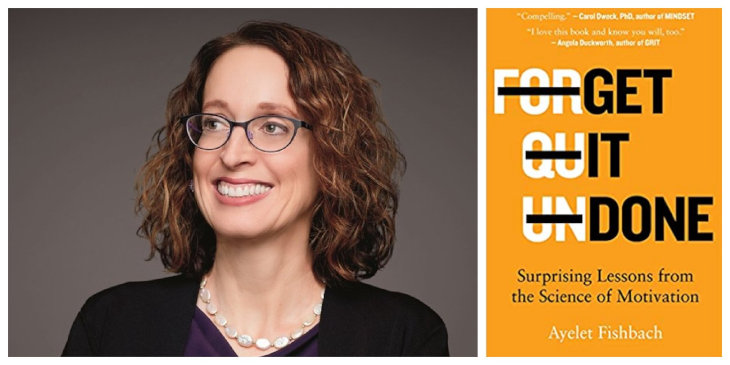 Iran’s Attack on Israel
Iran’s Attack on Israel


5 min read
Motivation expert Professor Ayelet Fishbach on how to achieve your goals this year.
Want to get more motivated? Stop blaming yourself for your lack of willpower and worrying about procrastination, says Professor Ayelet Fishbach, a psychology professor at the University of Chicago Booth School of Business, and expert on motivation and decision making. Her groundbreaking research enabled her to develop tools that can change your life and kick your habitual procrastination to the curb.
Professor Fishbach struggled with her own motivation more than 20 years ago when she was a graduate student learning to navigate life and control her own schedule.
“I did grad school in Israel and unlike my American grad student friends who were in school full time, I had two young children while working and pursuing a PhD. I do not recommend that to anyone…”
Her curiosity about motivation increased. She wondered, Why am I trying to do everything at the same time? How can I possibly make it work? Fishbach said in an Aish.com interview, “I wanted everything. I wanted to be financially comfortable. I wanted to be a mom. And I wanted it all at the exact same time.”
Despite wanting it all, staying motivated to reach her goal was a struggle. She realized that motivation is not reserved only for those who are disciplined. Rather, motivation is a type of knowledge anyone can acquire.
Although she wrote an entire book on this subject called, Get it Done, she claims that her research on this subject can be summed in one line: “In order to stay motivated, you have to change your circumstances and outlook, not your personality.”
 Professor Ayelet Fishbach
Professor Ayelet Fishbach
In other words, if you want to get motivated, change the situation or change how you think about it. “Motivation is not about willpower, discipline, or strength. It's about being wise.
Motivation is knowledge that can be learned.”
Here are the four tools to help you master motivation this year.
Not all goals are equal. To achieve success, we should choose goals that we are intrinsically motivated towards, not those that we are only externally motivated towards.
What predicts intrinsic motivation is how much you enjoy doing it. If you find pleasure in doing something, you’ll persist more, even in the face of challenge.
In one study Professor Fishbach conducted, she found that most people choose their profession based on pay rate, mistakenly thinking that financial motivation will keep them working hard. But what actually keeps you at our job is how much you enjoy it. And you must find enjoyment in doing the task rather than completing it. “Most of us want to be the person who has done it, not the person doing it.”
Select activities you enjoy pursuing. The more you feel like doing this as an end in itself, the more intrinsic the motivation.
Find the fun and inevitably, you will stick with it!
Is this pattern familiar to you? You get all riled up at the beginning of a particular goal, lose steam towards the middle and pick up energy at the end. Fishbach calls it “The Middle Problem”, asserting that people have high motivation at the start and end of projects. The solution? Mini goals and looking back.
Instead of creating a monthly work goal, create a weekly or even daily goal. Keep your goals short. If you cut out or shorten the middle, you are more likely to persist.
When it comes to long term goals, the end can seem out of reach. Another tip to sustaining motivation is looking back to see how far you have come. In one study, Fishbach observed people standing in long lines at amusement parks. “Those that looked back to see how far they had come had motivation to continue waiting.”
Temptations can derail your motivation but are also inevitable. Pushing them away may not be the best strategy. Rather, it is better to anticipate the temptations which will help you stay in control.
“When I anticipate that my colleague will be upset, I can better control my emotions when interfacing with him.”
In one study, Fishbach reminded employees of all the times they might be tempted to use office supplies for personal use. Interestingly, those reminded were less likely to steal compared to those in the control group.
It is important to recognize that you will not always stay in control and that is normal. When you remove your ego you are better equipped to learn from the situation.
Fishbach suggests a novel idea. Success leads you to the right choice, but failure can too. Instead of trying to avoid discomfort, seek it. Failure is your teacher. When you experience failure, you can infer what not to do.
“Your friends and family and other people you love are critical to your motivation. And you are critical to them as well.”
You can advise others even when you are struggling with a similar issue. In fact, when you are amidst a struggle, if you advise someone who is having a similar issue, everyone benefits.
My husband and I were both struggling to jog up a hill. He started to verbally encourage me amidst his own struggle.
When you are challenged, advising others can help you gain strength when you are grappling as well.
Professor Fishbach has dedicated her life to the study of motivation because she hopes that her research can help people achieve what they want to achieve. By setting the right goal, tightening the middle, avoiding temptation and seeking social support, you can stop procrastinating and get to where you want to go this year.

I found this particularly helpful advise and plan on reading the book! As a newly retired person I have struggled to find my way..sometimes lacking motivation to do even routine household chores. I have owned a business for 35 years and decided to step off the "hamster wheel" and retire not really having a plan of action to substitute my very busy lifestyle. Now, after about a year, I have new found hobbies and interests that motivate me to want to "get out there" daily. I am much happier with myself and realize how important it is to stay engaged in retirement.
This is incredible advice, as we head into 2024, or at any time. Thanks much.
I am reading the GET IT DONE book, and I am looking at Prof. Fishbach's YouTube videos. She has a new TEDx talk: https://www.youtube.com/watch?v=T8CegN1xssY
but there are other videos, shorter and longer.
Motivation is tricky. I think sometimes we think we are motivated, and we quit, And other times when we feel like quitting and we persist. This great advice, gives us an extra push, in these challenging times. Hatzlacha Raba and Thanks much Sarah and Aish.com